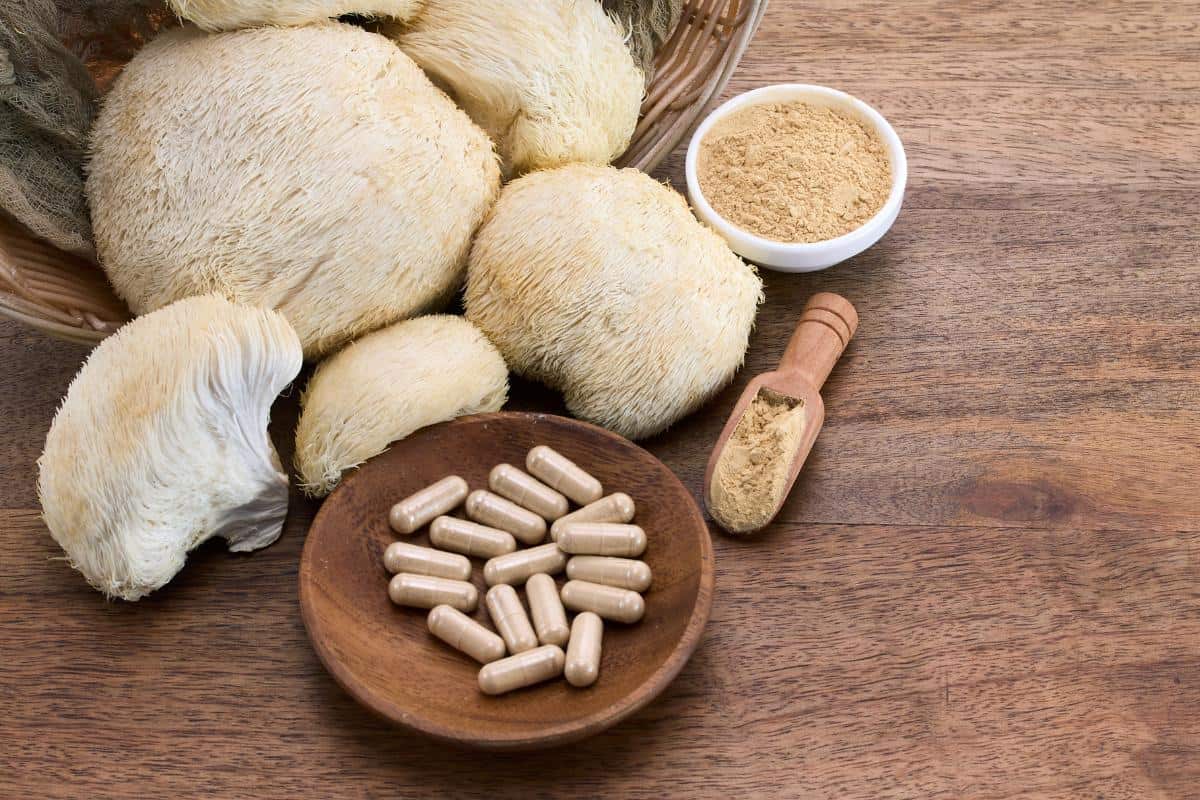Lion’s Mane: The Fuzzy Mushroom That Might Help You Lose Weight
You’ve probably heard people talking about lion’s mane mushrooms and weight loss. Or perhaps you’ve seen lion’s mane supplements promising everything from better brain power to a slimmer waistline. But what’s the real story? Can this peculiar-looking fungus actually help you lose weight? And more importantly, is it safe to add to your daily routine?
Let’s explore what science really says about lion’s mane and weight loss. I’ll look at what makes this mushroom special, examine the evidence behind the claims, and help you decide if it’s worth trying Lions mane for weight loss.

What Exactly Is Lion’s Mane?
Lion’s mane (Hericium erinaceus) stands out in the mushroom world. Unlike the typical cap-and-stem variety you’d find on pizza, lion’s mane looks more like a white pom-pom or a cascading waterfall of icicles. This unique appearance has earned it several nicknames, including bearded tooth mushroom and pom pom mushroom.
For centuries, traditional Chinese medicine has prized lion’s mane for its supposed health benefits. Ancient practitioners believed it could support digestive health and overall vitality. Today, this mushroom has found its way into modern kitchens and supplement bottles around the world.
You can find lion’s mane in several forms. Fresh mushrooms sometimes appear in gourmet grocery stores and farmers’ markets. They have a meaty texture that many compare to crab or lobster. Dried powder forms the base for many supplements. And concentrated extracts promise higher strength in smaller doses.
The mushroom contains several bioactive compounds that researchers find interesting. These include beta-glucans, hericenones, and erinacines. These substances might explain why lion’s mane has caught the attention of both scientists and wellness gurus. But is it actually true that you can use lion’s mane for weight loss, or is it just another fad?
The Science Behind Lion’s Mane for Weight Loss
The connection between lion’s mane and weight loss isn’t as straightforward as you might hope or have been led to believe. No studies have directly tested whether taking lion’s mane supplements helps people lose weight. But researchers have discovered some intriguing mechanisms that might support weight management.
Blood Sugar Regulation
One of the most promising areas involves blood sugar control. When your blood sugar levels spike and crash throughout the day, your body often responds by storing more fat and triggering hunger pangs. Some animal studies suggest lion’s mane might help smooth out these fluctuations.
Research on diabetic mice suggests that lion’s mane extract lowered blood sugar levels after meals. The mushroom seemed to slow carbohydrate absorption in the digestive system. This gentler rise and fall in blood sugar could, in theory, reduce fat storage and, as a result, control appetite.
Of course, mice aren’t humans. What works in laboratory animals doesn’t always translate to real-world results for people. But these findings provide a starting point for understanding the thoughts behind lion’s mane for weight loss.
Gut Health and Metabolism
Your digestive system plays a huge role in weight management. The trillions of bacteria living in your gut help process food, regulate hormones, and even influence your mood. When this ecosystem falls out of balance, weight gain often follows.
Lion’s mane contains prebiotic fibres that feed beneficial gut bacteria. Some studies suggest these compounds might help restore balance to your digestive system. A healthier gut could mean better metabolism, reduced inflammation, and a more stable weight.
The mushroom might also support the intestinal barrier. This protective lining prevents harmful substances from entering your bloodstream. When this barrier breaks down, inflammation increases throughout your body. This chronic inflammation has been linked to obesity and metabolic problems.
Inflammation Reduction
Speaking of inflammation, lion’s mane appears to have anti-inflammatory properties. Chronic inflammation can interfere with hormones that control hunger and fat storage. By reducing inflammation, lion’s mane might help these systems work more effectively.
Some research suggests the mushroom’s beta-glucans can modulate immune responses and reduce inflammatory markers. This could create a more favourable environment for weight loss, though more human studies are needed to confirm this effect.
Lion’s Mane for Weight Loss as a Nootropic
Lion’s mane has also gained attention as a nootropic – a substance that might enhance brain function. This cognitive connection could indirectly support weight loss efforts in several ways.
The mushroom contains unique compounds called hericenones and erinacines. These substances can cross the blood-brain barrier and potentially stimulate the production of nerve growth factor. This protein helps maintain and repair brain cells.
Better brain function might lead to improved decision-making around food choices. When your mind is sharp and focused, you’re more likely to stick to healthy eating plans and resist impulsive snacking. Some people report feeling more motivated to exercise when taking lion’s mane supplements.
Stress management represents another potential benefit. Chronic stress triggers the release of cortisol, a hormone that promotes fat storage, especially around the midsection. If lion’s mane helps you think more clearly and manage stress better, this could indirectly support weight management.
Sleep quality might also improve with better brain health. Poor sleep disrupts hormones that control hunger and satiety. Getting better rest could help regulate these systems and support your weight loss goals.
So the fact that Lion’s Mane is said to help your brain in these ways could mean Lion’s Mane for weight loss is possible. That said, everyone is different, and personally, I think more research is needed.
Other Health Benefits Worth Knowing
While lion’s mane for weight loss gets a lot of attention, lion’s mane offers several other potential health benefits that might interest you.
Heart Health Support
Some research suggests lion’s mane might help improve fat metabolism and reduce oxidative stress on the cardiovascular system. The mushroom contains compounds that could help lower bad cholesterol levels and support overall heart health.
Immune System Boost
The beta-glucans in lion’s mane might help strengthen your immune system. A robust immune system helps your body function optimally, which could indirectly support your weight management efforts.
Digestive Comfort
Traditional use of lion’s mane for digestive health has some scientific backing. The mushroom might help protect the stomach lining and reduce inflammation in the digestive tract. Better digestive health often goes hand in hand with easier weight management. This leads people to talk about lion’s mane for weight loss, but in reality, is it just improving digestive health? Something worth thinking about.
What the Research Really Shows
Let’s be completely honest about the current state of research. While the studies I’ve mentioned show some promise of the benefits of lion’s mane for weight loss, most have been conducted on animals or in laboratory settings. Human clinical trials specifically testing lion’s mane for weight loss are virtually non-existent.
The few human studies that do exist have focused mainly on cognitive function and nerve health. These trials have generally shown lion’s mane to be safe for most people, with few side effects reported.
One small study followed older adults taking lion’s mane supplements for several weeks. Participants showed improvements in cognitive function compared to those taking placebo pills. However, the researchers didn’t measure weight changes or metabolic markers.
Another study looked at people with mild digestive complaints. Those taking lion’s mane extract reported feeling better and showed improvements in gut bacteria diversity. Again, weight wasn’t specifically measured.
This research gap doesn’t mean there aren’t benefits of lion’s mane for weight loss. It simply means we need more human studies to know for sure.
How to Use Lion’s Mane Safely
If you decide to try lion’s mane, several options are available. Fresh mushrooms offer the most natural approach. You can sauté them like any other mushroom, though they’re often much more expensive than common varieties.
Dried powder supplements provide a more concentrated dose. Most manufacturers recommend starting with 500-1000mg daily, though optimal dosing hasn’t yet been established through research.
Concentrated extracts offer the highest potency but also come with higher price tags. These products typically contain standardised amounts of active compounds.
Look for supplements that have been third-party tested for purity and potency. The supplement industry isn’t as strictly regulated as the pharmaceutical industry, so quality can vary widely between brands.
Start with lower doses to see how your body responds. Some people report mild stomach upset when first trying lion’s mane for weight loss, especially on an empty stomach.
Potential Side Effects of Lions mane for weight loss and Precautions
Lion’s mane appears to be quite safe for most people. The few reported side effects include:
- Mild stomach upset
- Skin rashes (rare)
- Dizziness (very rare)
People with mushroom allergies should obviously avoid lion’s mane. If you take medications for diabetes or blood clotting, consult your healthcare provider before adding lion’s mane supplements. The mushroom might enhance the effects of these medications.
Pregnant and breastfeeding women should, as always, be cautious, as safety data for these populations is extremely limited.
Setting Realistic Expectations
Lion’s Mane for weight loss is not a magic fix; if it does help, it is likely to only be of minimal help. No supplement can replace the fundamentals of weight loss, such as healthy eating and regular physical activity.
However, lion’s mane may offer some supportive benefits that make your weight-loss journey easier. Better blood sugar control could reduce cravings. Improved gut health might boost your metabolism. Enhanced mental clarity could help you make better food choices.
Think of lion’s mane for weight loss as one tool in a larger toolkit rather than a standalone solution. It works best when combined with other healthy lifestyle changes. Almost like tracking your water intake will help you lose weight, but not if you drink lots of water but eat takeaway daily!
The mushroom benefits extend beyond potential weight loss, too. If you’re interested in cognitive enhancement, digestive health, or general wellness, lion’s mane might offer value even if it doesn’t directly impact the number on your scales.
Trying Lion’s Mane
Lion’s mane for weight loss remains an interesting subject; the mushroom’s effects on blood sugar, gut health, and brain function could indirectly support your wellness goals, but they could not, too!
If you’re curious about trying lion’s mane, start slowly and keep a close eye on how your body responds. Consider it one part of a comprehensive approach to health that includes balanced nutrition, regular exercise, adequate sleep, and stress management.
Remember that sustainable weight loss takes time and patience. No single supplement, no matter how promising, can shortcut this process. But with realistic expectations and a commitment to overall health, lion’s mane for weight loss might just help a little alongside the other things you are trying.
Have you considered lion’s mane for weight loss? Is this something you are intrigued by, too? Have I answered your questions? Let me know what you think about lion’s mane for weight loss in the comments below.






